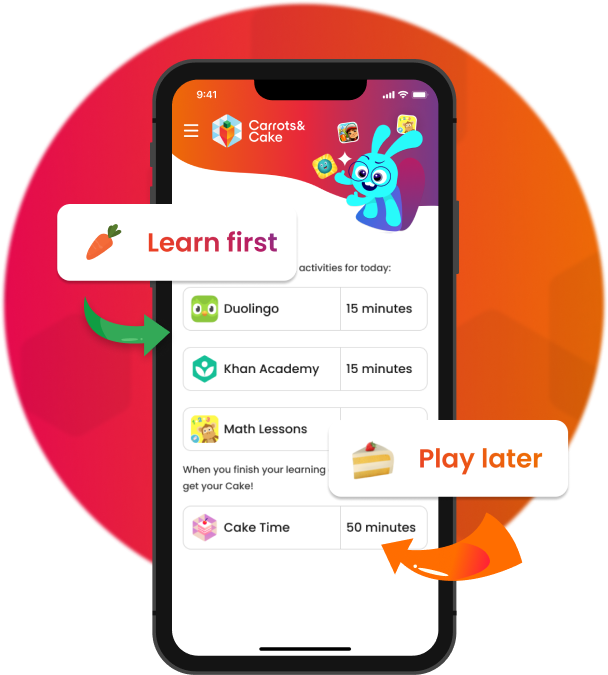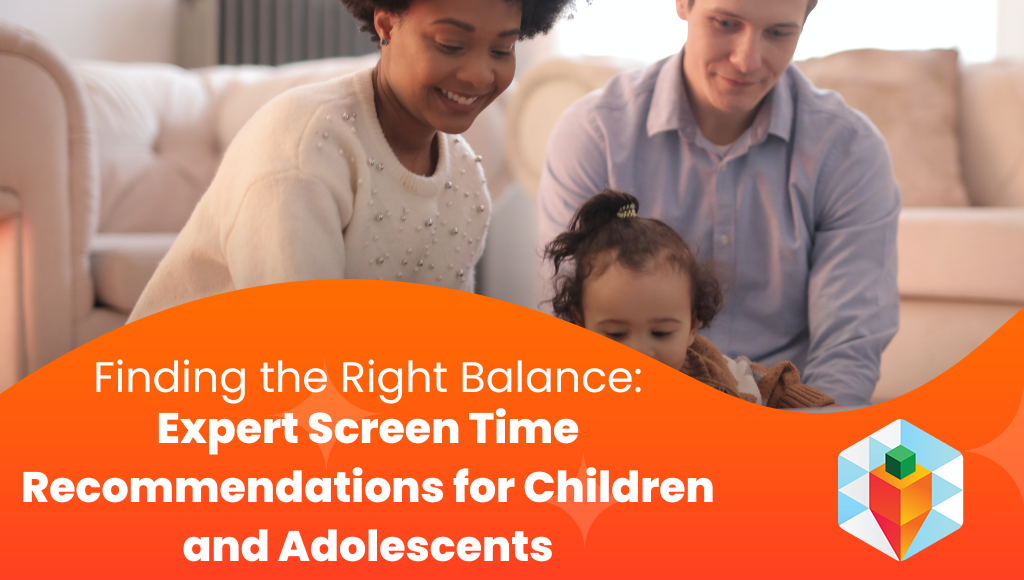


As parents, we know that screen time recommendations for our children can be tricky to navigate. Staying abreast of the constantly shifting digital landscape and tech advancements is critical to effectively regulating kids' use and access of screens. In this article, we'll explore understanding screen time boundaries, tips for setting limits with your family rules around tech usage, and educational resources available online and offline for young minds - all while keeping up with current digital trends.
Screen time is the amount of time a person spends using electronic devices such as smartphones, tablets, computers, and video games. It can have both positive and negative impacts on physical, mental, and social development, depending on how it’s used.
What is Screen Time? Screen time includes activities like watching television or movies, playing video games, browsing the internet for information or entertainment purposes (social media), texting friends or family members, and engaging in online shopping or gaming sites. It also includes any type of device that has an interactive display such as virtual reality headsets and smart watches. Most experts suggest that, for children aged 3-10 years old, screen time should be kept to a maximum of two hours daily.
Prolonged use of screens can be damaging, including sleep deprivation leading to poorer academic performance; obesity from insufficient physical exercise while sitting for long periods in front of devices; and addiction which may cause an increase in risk-taking behavior as well as a decrease in face-to-face communication skills. Keywords: Sleep Deprivation, Academic Performance, Obesity, Physical Activity, Addiction, Risk Taking Behavior.
To ensure their children are exposed to a healthy mix of digital and non-digital activities, parents should be aware of the consequences associated with excessive screen time. By establishing rules and guidelines around technology use, kids can learn how to develop healthier habits when it comes to screen time usage.
It's important for parents to set boundaries around their children’s screen time. Establishing healthy habits and rules can help kids use technology in a more productive way.
To achieve a healthy balance between digital and offline experiences, parents should set aside times when screens are not allowed while also promoting activities such as outdoor play, reading books, arts & crafts, board games, and puzzles. This means setting aside specific times of the day when screens aren't allowed, such as during meals or bedtime. Parents should also encourage outdoor play, reading books, arts & crafts, board games, puzzles etc., so that kids don't become overly reliant on screens for entertainment. Additionally, it's important to limit the amount of time spent using devices each day so that other activities have room to be enjoyed too.

Kids should be taught how to properly handle devices like phones and tablets from an early age. Parents should emphasize the importance of proper etiquette when using technology, as well as explain potential risks associated with online activity (e.g., cyberbullying), in order to ensure their kids use devices safely and responsibly. Kids should also understand what kind of content is appropriate at their age level - this includes understanding which apps they can access safely without parental supervision or monitoring software installed on their device(s). Finally, talking about internet safety is key - teaching kids not to share personal information online or click on suspicious links will go a long way in protecting them from harm while browsing the web unsupervised.
Setting boundaries for kids is an important step in helping them develop healthy habits around technology use. By monitoring their usage and encouraging other activities, parents can take proactive steps to manage screen time with the help of parental control apps.
Monitoring Your Child's Technology Use
Parents should be mindful of their kids' utilization of tech. Setting limits and monitoring the types of websites, apps, and games your child is using can help ensure they are not exposed to inappropriate content or activities. Parents should also be vigilant about who their child is interacting with online. Establishing rules for screen time that include times when screens must be turned off can help parents keep track of what their kids are doing online.
Encouraging Other Activities Besides Screens
It’s important for parents to encourage other activities besides screens in order to develop healthy habits in their children. This includes playing outside, reading books, taking part in creative projects such as art or music, and spending quality time with family members away from devices. Encouraging these activities will not only reduce the amount of time spent on screens but also promote physical activity and mental stimulation that comes from engaging with others offline.
Using Parental Control Apps To Help Manage Screen Time
Parental control apps can provide an extra layer of protection when it comes to managing screen time usage for kids aged 3-10 years old. These apps allow parents to set up restrictions on certain sites or applications as well as monitor internet use by tracking which websites have been visited or blocked by a device user at any given moment in real time. Some parental control apps even offer features like app blocking so you can prevent your child from accessing certain applications altogether if needed.
By monitoring your child's technology use, encouraging other activities besides screens, and using parental control apps to help manage screen time, parents can take proactive steps towards helping their children develop healthy digital habits. Moving on, there are a variety of educational technology resources available for kids that parents should consider when choosing quality content online or selecting age appropriate apps and games.
Parents must remain vigilant in regard to the sort of material their kids are exposed to when navigating online. With so much available on the internet, it’s important for parents to vet any websites or apps that their children may be using. Parents should look for sites and apps that have been reviewed by educational professionals and are geared toward a child’s age group. Parents should ensure that the content their children are exposed to is age-appropriate and free from any offensive material.

Choosing quality educational apps and games can also help foster healthy digital habits in kids. It is important for parents to find activities that will engage their child’s minds without overstimulating them with flashy graphics or intense gameplay elements. Look for learning opportunities within an app such as puzzles, problem-solving tasks, reading exercises and other cognitive activities which can challenge your child while providing entertainment simultaneously. Additionally, try looking into subscription services like ABC Mouse, which offer a wide range of interactive lessons designed specifically for young learners aged 3-10 years old.
Educational technology resources for kids can provide parents with the tools and information they need to ensure their children are using screens safely. Parents can keep abreast of digital developments and tech to guarantee their kids are able to access age-appropriate content on the web, whilst also knowing the benefits and drawbacks of new technologies.
Staying Up To Date on the Latest Research
It is essential for parents to stay informed about digital trends and technologies, so they can make informed decisions when it comes to their children’s screen time. Keeping abreast of current studies is the key to making informed decisions about screen time for children. Parents should read articles from reputable sources such as medical journals, educational publications, and technology blogs that provide reliable information on topics related to digital trends and technologies. Additionally, parents should follow experts in the field of child development who have experience working with kids online or in a tech setting. This will help them understand how different technologies are impacting children's lives and give them insights into what might be beneficial or detrimental for their own children.

Understanding the Pros and Cons of New Technologies
Keeping abreast of the most current studies is essential, but it's also vital for parents to comprehend both the advantages and disadvantages of new technologies before permitting their kids access. For example, some new apps may offer great educational opportunities but could also come with risks such as inappropriate content or ads targeting young users. It is important for parents to weigh these factors carefully before deciding whether a particular app or game is appropriate for their child’s age group. Parents should evaluate reviews from other users and seek advice from experts to determine if an app is suitable for their children.
The recommendation for screen time is to use it in moderation. Screen time should be used as a way to facilitate learning, exploration, and growth - not an alternative to physical activity or socializing. Parents should set clear boundaries on how much time their kids spend online and monitor their usage regularly. Setting limits can also help reduce the risk of addiction and ensure that digital activities are beneficial rather than harmful.
Experts agree that screen time can be beneficial for children when used in moderation. It can help them learn, stay connected with family and friends, and even explore new interests. Yet, it is essential to place restrictions on how much time is devoted to digital activities in order for children's healthy development. Excessive exposure to screens has been linked to physical and mental health issues, such as obesity, sleep deprivation, anxiety, and depression. Parents should also monitor their child’s digital activities by setting appropriate boundaries while still allowing exploration within those guidelines.
The CDC suggests limiting screen time for children aged 3-10 years old to no more than 1 hour per day of high-quality programming and encourages adults to supervise their child's media use as well as establish device-free times. They suggest that parents should also be actively involved in their child’s media use by monitoring what they are watching, playing, or doing online. Additionally, the CDC encourages adults to set aside device-free times, such as family meals and bedtime routines where devices are not used at all. Finally, they recommend setting limits on content and providing age-appropriate guidance when it comes to choosing apps and other digital activities.
Research has consistently shown that limiting screen time is beneficial for children's development. Studies have indicated that over-engagement with screens may result in physical, psychological, and emotional complications such as obesity, sadness, unease, sleep disturbances, and focus issues. It is important for parents to set limits on their child's digital device usage in order to ensure healthy growth and development. By creating a balance between online activities and offline playtime with family or friends, kids can learn how to use technology responsibly while also enjoying the benefits of interacting with others in person.
It is essential to stay up-to-date on the most recent digital advancements and set restrictions for kids concerning screen time. By creating age-appropriate recommendations and providing educational resources, parents can help their kids develop healthy habits around technology use while still reaping its potential benefits. Screen time should be managed in a way that promotes physical activity, social interaction, creativity, and overall wellbeing—a balance that will serve our children now and into adulthood.
Take control of your child's screen time with Carrots&Cake! Our app provides parents and caregivers with the tools they need to help kids develop healthy digital habits.






